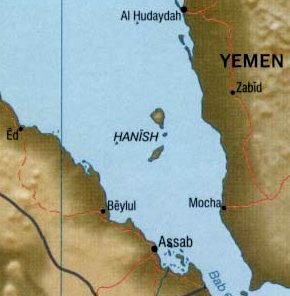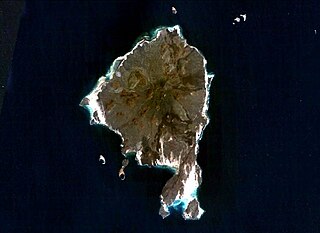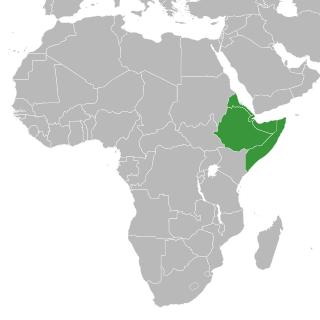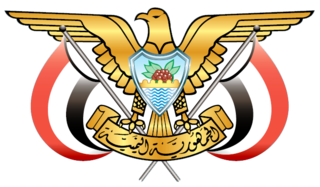| |||||
| Decades: | |||||
|---|---|---|---|---|---|
| See also: | Other events of 1995 Timeline of Eritrean history | ||||
Events in the year 1995 in Eritrea .
| |||||
| Decades: | |||||
|---|---|---|---|---|---|
| See also: | Other events of 1995 Timeline of Eritrean history | ||||
Events in the year 1995 in Eritrea .

The Politics of Eritrea and the Government of Eritrea takes place in a framework of a single-party presidential republican totalitarian dictatorship. The President officially serves as both head of state and head of government. The People's Front for Democracy and Justice is the only political party legally permitted to exist in Eritrea. The popularly elected National Assembly of 150 seats, formed in 1993 shortly after independence from Ethiopia, elected the current president, Isaias Afewerki. There have been no general elections since its official independence in 1993. The country is governed under the constitution of 1993. A new constitution was ratified in 1997, but has not been implemented. Since the National Assembly last met in January 2002, President Isaias Afwerki has exercised the powers of both the executive and legislative branches of government.

Yemen is located in Southwest Asia, at the southern tip of the Arabian Peninsula, between Oman and Saudi Arabia. It is situated at the entrance to the Bab-el-Mandeb Strait, which links the Red Sea to the Indian Ocean and is one of the most active and strategic shipping lanes in the world. Yemen has an area of 527,970 square kilometres (203,850 sq mi), including the islands of Perim at the southern end of the Red Sea and Socotra at the entrance to the Gulf of Aden. Yemen's land boundaries total 1,746 kilometres (1,085 mi). Yemen borders Saudi Arabia to the north and Oman to the northeast. Through the Socotra island, Yemen also shares borders with the Guardafui Channel and the Somali Sea.

Abdul Karim Ali Al-Iryani or Al-Eryani was the Prime Minister of Yemen from 29 April 1998 to 31 March 2001. Al-Eryani, along with President Ali Abdullah Saleh, was the Secretary General of the General People's Congress (GPC).

The Dahlak Archipelago is an Eritrean island group located in the Red Sea near Massawa, Eritrea. It consists of two large and 124 small islands. The pearl fisheries of the archipelago have been famous since Roman times and still produce a substantial number of pearls.

The Hanish Islands conflict was a dispute between Yemen and Eritrea over the island of Greater Hanish in the Red Sea, one of the largest in the then disputed Zukur-Hanish archipelago. Fighting took place over three days from 15 December to 17 December 1995. In 1998 the Permanent Court of Arbitration determined that the territory belonged to Yemen.

The Hanish Islands is an archipelago in the Red Sea consisting of a trio of major islands at the centre of an array of smaller islets and rocks. The three major islands are the northern Zuqar Island, the southern Great Anish, and the significantly smaller Little Anish in between. The archipelago is largely under the control of Yemen, with only several small south-western rocks and islets granted to Eritrea following the Hanish Islands conflict in 1996.

Zuqar Island is an island in the Red Sea that belongs to Yemen. It lies between the coasts of mainland Yemen and Eritrea, near the Bab-el-Mandeb straits which connect the Red Sea to the Gulf of Aden. Despite its proximity to the African continent, Zuqar Island is considered a part of Asia because it sits on the Asian continental shelf. It is appropriately 130 km2.

Conflicts in the Horn of Africa have been occurring since the 17th century BCE. The Horn of Africa includes the nations of Djibouti, Eritrea, Ethiopia, and Somalia.

Jabal al-Tair Island is a roughly oval volcanic island in Yemen, northwest of the constricted Bab al-Mandab passage at the mouth of the Red Sea, about halfway between mainland Yemen and Eritrea. From 1996 until it erupted in 2007, Yemen maintained two watchtowers and a small military base on the island.

The following outline is provided as an overview of and topical guide to Eritrea:

Eritrea, officially the State of Eritrea, is a country in the Horn of Africa region of Eastern Africa, with its capital and largest city at Asmara. It is bordered by Ethiopia in the south, Sudan in the west, and Djibouti in the southeast. The northeastern and eastern parts of Eritrea have an extensive coastline along the Red Sea. The nation has a total area of approximately 117,600 km2 (45,406 sq mi), and includes the Dahlak Archipelago and several of the Hanish Islands.

The Yemeni Navy and Coastal Defence Forces is the maritime component of the armed forces of Yemen. Yemen's navy was created in 1990 when North and South Yemen united.
Eritrea is one of the three non-member states of the Arab League which adopted Arabic as a working language, and is the closest to become an Arab League member, with Chad and Israel having numerous problems with the League.
This is a survey of the postage stamps and postal history of Eritrea.

Eritrea–Yemen relations refers to the current and historical relationship between Eritrea and Yemen. The states fought briefly over the Hanish Islands in the Red Sea in 1995. In 2004, Eritrean President Isaias Afewerki was invited to and visited Yemen for a two-day working visit. He was accompanied by a number of government ministers and high-ranking military personnel, including foreign minister Ali Said Abdella.
Abdullah al-Saidi is a Yemeni diplomat. He served as the Yemeni Ambassador to the United Nations from 22 July 2002 to 2011, replacing Abdullah Saleh al-Ashtal. He quit his position over the 2011 Yemeni uprising. He was replaced by Jamal Abdullah al-Sallal as the Ambassador to the UN.

Eritrea–Israel relations are foreign relations between Eritrea and Israel. Both countries established diplomatic relation in 1993 following Eritrean independence. Eritrea has an embassy in Ramat Gan and Israel has an embassy in Asmara. Israeli-Eritrean ties are complicated by Israel's close ties to Ethiopia, who have shared an unfriendly dyad with Eritrea for a long time. Nevertheless, their ties are generally considered as very close.
Bay of Beylul or Bēylul Bahir Selat'ē, also known as Badi Bay, is a bay on the Red Sea, on the coast of Eritrea. The bay is located about 450 km southeast of Asmara.
Pristurus schneideri is a species of lizard in the family Sphaerodactylidae. The species is endemic to Yemen.